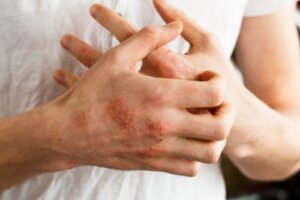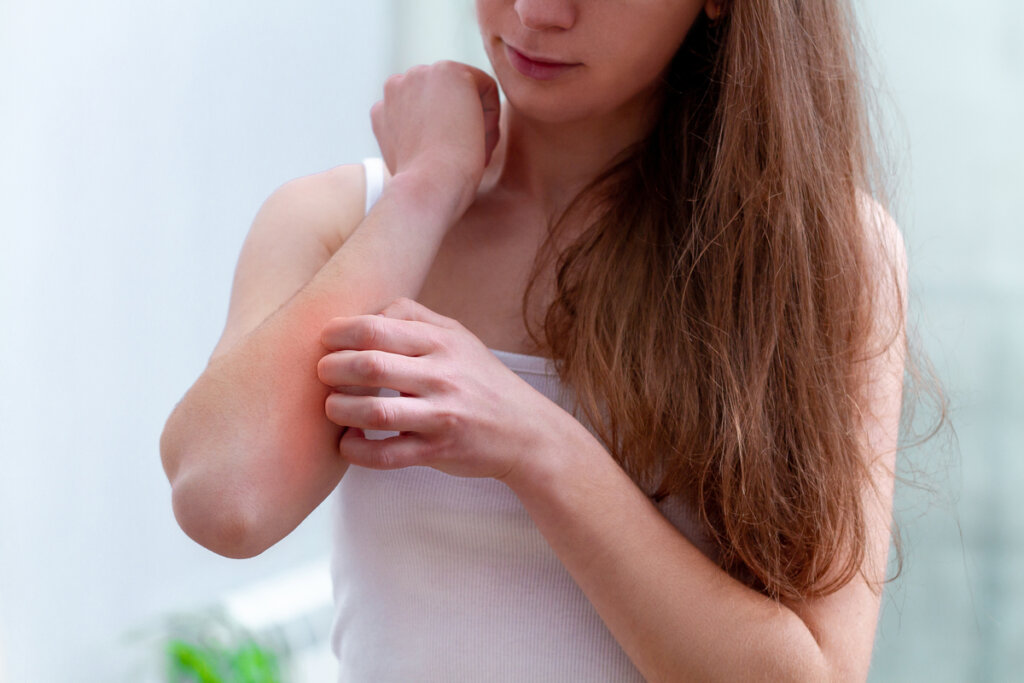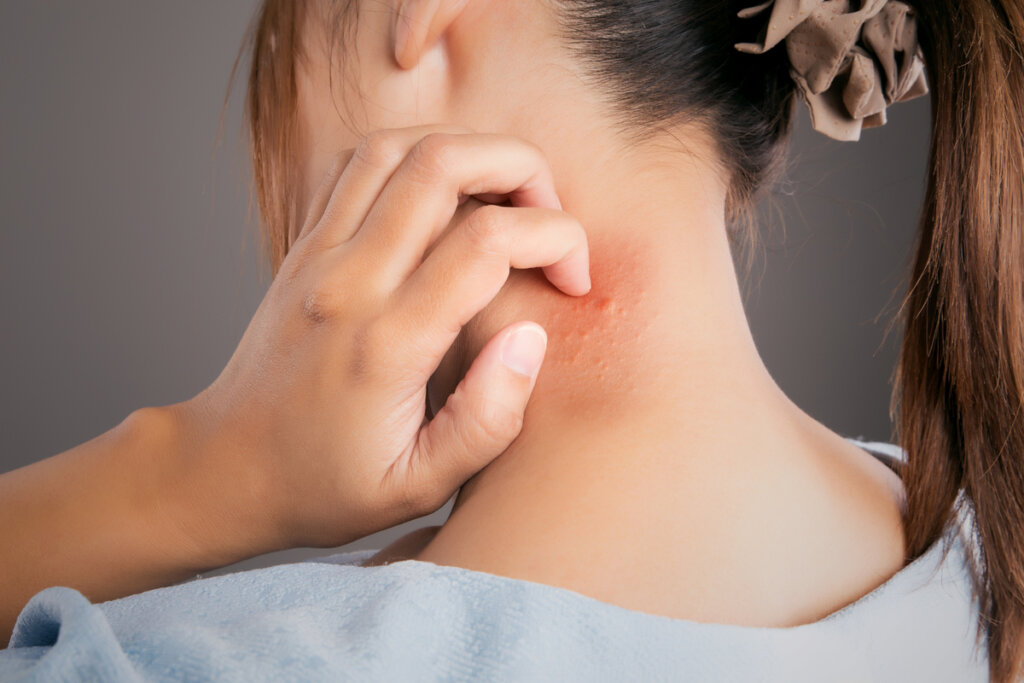Neurodermatitis: Causes, Symptoms, and Treatment


Written and verified by the psychologist Laura Ruiz Mitjana
Neurodermatitis is a common chronic skin disease. It involves an itchy sensation on different parts of the body. It’s not life-threatening, but it can lead to complications. Moreover, it can have significant psychosocial effects and lead to sleep disorders and sexual dysfunctions.
According to a study conducted by Jin-Gang et al. (2013), patients with neurodermatitis tend to possess poor social skills and interpersonal resources, and lack flexibility.
In addition, their overall quality of life may be worse. However, what else do we know about neurodermatitis? What are its symptoms, causes, and treatments?
Neurodermatitis
Neurodermatitis, also called lichen simplex chronicus, is a skin disease that begins with an itchy patch on the skin. When someone suffers from neurodermatitis, they tend to scratch frequently because their skin itches, but this only increases the itching.
The itch-scratch cycle causes the affected skin to thicken and become even rougher. In the case of neurodermatitis, spots may also appear on the skin. They usually appear on the thighs, ankles, wrists, forearms, and neck.

Interference in daily life
This disease isn’t potentially fatal or contagious, but the itching felt by the sufferer can be so intense or recurrent that it significantly interferes with their daily life. In fact, it interferes with their sleep and negatively affects their quality of life in general.
It can also affect their sexuality. Indeed, according to a study conducted by Mercan et al. (2008), sufferers of neurodermatitis experience a higher incidence of sexual problems. These are even higher than in sufferers of psoriasis (another skin disease).
Symptoms of neurodermatitis
The most common signs and symptoms of neurodermatitis are as follows:
- One or more itchy spots on the skin.
- The appearance of a leathery or scaly texture in the affected areas.
- One or more rough, raised spots, usually darker in color than the rest of the skin (for example, red).
It’s also a disease that can compromise other areas close to those that are itchy. This includes the forearms, wrists, head, neck, ankles, and even the anus, vulva, and scrotum.
The itching can be either continuous or discontinuous. It may also be more or less intense depending on the individual and the time of day. Some sufferers even scratch while they’re sleeping.
Furthermore, neurodermatitis can emotionally affect the sufferer. According to a study conducted by Bhatia et al. (1996), patients with neurodermatitis score higher on the scales used to assess depression.
Causes of neurodermatitis
The cause of neurodermatitis is generally unknown. That said, it’s known that the recurrent rubbing and scratching can be initiated by something that simply irritates the skin. For example, an insect bite or the wearing of tight clothing.
When the sufferer scratches or rubs the affected area, the itching increases in intensity. Moreover, the more they scratch, the more it itches.
Skin diseases
Neurodermatitis has also been linked to other skin diseases. For example, dry skin and psoriasis.
Other related factors
Anxiety and stress are also factors that can trigger the characteristic itching of neurodermatitis.
Can neurodermatitis be treated?
It’s difficult to break the itch-scratch cycle typical of this disease and in many cases, it’s a chronic disease. However, it can be treated.
The success of the treatment depends on the sufferer’s resistance to the need to scratch or rub the affected areas and the effectiveness of the medications used.
There are certain drugs, prescription or over-the-counter, that help relieve itching. It’s also important to identify and eliminate any factors that are maintaining and worsening the problem.

Treatment for neurodermatitis
The various treatments for neurodermatitis have different objectives. Some control itching while others prevent scratching. But, they all address the causes of the disease. The different types of drugs used include:
- Medicated anti-itch creams.
- Drugs to relieve itching. Antihistamines can reduce this feeling, especially at night.
- Injectable corticosteroids.
- Anxiolytic medications to address anxiety.
- Medication patches. For example, topical lidocaine or capsaicin patches.
In addition, phototherapy is used. Indeed, sometimes, exposing the affected skin to certain types of light can work well. Finally, at a psychological level, work is done so that the sufferer reduces the sources of their stress and anxiety. They might work on emotional management and the kinds of behaviors that either generate or prevent itching and scratching.
Neurodermatitis is a skin disease that causes the sufferer to scratch persistently. This can cause complications. For instance, wounds, bacterial infections, or even scarring.
The itching that the sufferer with neurodermatitis feels can interfere with the quality of their sleep, their sexual life, and their overall quality of life. Therefore, if you’re suffering from any of its symptoms, you must visit your doctor.
Neurodermatitis is a common chronic skin disease. It involves an itchy sensation on different parts of the body. It’s not life-threatening, but it can lead to complications. Moreover, it can have significant psychosocial effects and lead to sleep disorders and sexual dysfunctions.
According to a study conducted by Jin-Gang et al. (2013), patients with neurodermatitis tend to possess poor social skills and interpersonal resources, and lack flexibility.
In addition, their overall quality of life may be worse. However, what else do we know about neurodermatitis? What are its symptoms, causes, and treatments?
Neurodermatitis
Neurodermatitis, also called lichen simplex chronicus, is a skin disease that begins with an itchy patch on the skin. When someone suffers from neurodermatitis, they tend to scratch frequently because their skin itches, but this only increases the itching.
The itch-scratch cycle causes the affected skin to thicken and become even rougher. In the case of neurodermatitis, spots may also appear on the skin. They usually appear on the thighs, ankles, wrists, forearms, and neck.

Interference in daily life
This disease isn’t potentially fatal or contagious, but the itching felt by the sufferer can be so intense or recurrent that it significantly interferes with their daily life. In fact, it interferes with their sleep and negatively affects their quality of life in general.
It can also affect their sexuality. Indeed, according to a study conducted by Mercan et al. (2008), sufferers of neurodermatitis experience a higher incidence of sexual problems. These are even higher than in sufferers of psoriasis (another skin disease).
Symptoms of neurodermatitis
The most common signs and symptoms of neurodermatitis are as follows:
- One or more itchy spots on the skin.
- The appearance of a leathery or scaly texture in the affected areas.
- One or more rough, raised spots, usually darker in color than the rest of the skin (for example, red).
It’s also a disease that can compromise other areas close to those that are itchy. This includes the forearms, wrists, head, neck, ankles, and even the anus, vulva, and scrotum.
The itching can be either continuous or discontinuous. It may also be more or less intense depending on the individual and the time of day. Some sufferers even scratch while they’re sleeping.
Furthermore, neurodermatitis can emotionally affect the sufferer. According to a study conducted by Bhatia et al. (1996), patients with neurodermatitis score higher on the scales used to assess depression.
Causes of neurodermatitis
The cause of neurodermatitis is generally unknown. That said, it’s known that the recurrent rubbing and scratching can be initiated by something that simply irritates the skin. For example, an insect bite or the wearing of tight clothing.
When the sufferer scratches or rubs the affected area, the itching increases in intensity. Moreover, the more they scratch, the more it itches.
Skin diseases
Neurodermatitis has also been linked to other skin diseases. For example, dry skin and psoriasis.
Other related factors
Anxiety and stress are also factors that can trigger the characteristic itching of neurodermatitis.
Can neurodermatitis be treated?
It’s difficult to break the itch-scratch cycle typical of this disease and in many cases, it’s a chronic disease. However, it can be treated.
The success of the treatment depends on the sufferer’s resistance to the need to scratch or rub the affected areas and the effectiveness of the medications used.
There are certain drugs, prescription or over-the-counter, that help relieve itching. It’s also important to identify and eliminate any factors that are maintaining and worsening the problem.

Treatment for neurodermatitis
The various treatments for neurodermatitis have different objectives. Some control itching while others prevent scratching. But, they all address the causes of the disease. The different types of drugs used include:
- Medicated anti-itch creams.
- Drugs to relieve itching. Antihistamines can reduce this feeling, especially at night.
- Injectable corticosteroids.
- Anxiolytic medications to address anxiety.
- Medication patches. For example, topical lidocaine or capsaicin patches.
In addition, phototherapy is used. Indeed, sometimes, exposing the affected skin to certain types of light can work well. Finally, at a psychological level, work is done so that the sufferer reduces the sources of their stress and anxiety. They might work on emotional management and the kinds of behaviors that either generate or prevent itching and scratching.
Neurodermatitis is a skin disease that causes the sufferer to scratch persistently. This can cause complications. For instance, wounds, bacterial infections, or even scarring.
The itching that the sufferer with neurodermatitis feels can interfere with the quality of their sleep, their sexual life, and their overall quality of life. Therefore, if you’re suffering from any of its symptoms, you must visit your doctor.
All cited sources were thoroughly reviewed by our team to ensure their quality, reliability, currency, and validity. The bibliography of this article was considered reliable and of academic or scientific accuracy.
- Carrascosa, J.M. (2004). Phototherapy and photochemotherapy. Actas Dermo-Sifiliográficas, 95(5): 259-284. https://doi.org/10.1016/S0001-7310(04)76817-9
-
Jin-Gang An, Yan-Ting Liu, Sheng-Xiang Xiao, Jun-Min Wang, Song-Mei Geng, Ying-Ying Dong Int. (2013). Quality Of Life of Patients with Neurodermatitis. J Med Sci. 2013; 10(5): 593–598. doi: 10.7150/ijms.5624
- Mercan S, Altunay IK, Demir B, Akpinar A, Kayaoglu S. Sexual dysfunctions in patients with neurodermatitis and psoriasis. J Sex Marital Ther. 2008;34(2):160–8.
- Niemeier, V. et al. (1997). Skin disease and sexuality. An empirical study of sex behavior or patients with psoriasis vulgaris and neurodermatitis in comparison with skin-healthy probands. DOI: 10.1007/s001050050635 PMID: 9410846
This text is provided for informational purposes only and does not replace consultation with a professional. If in doubt, consult your specialist.







